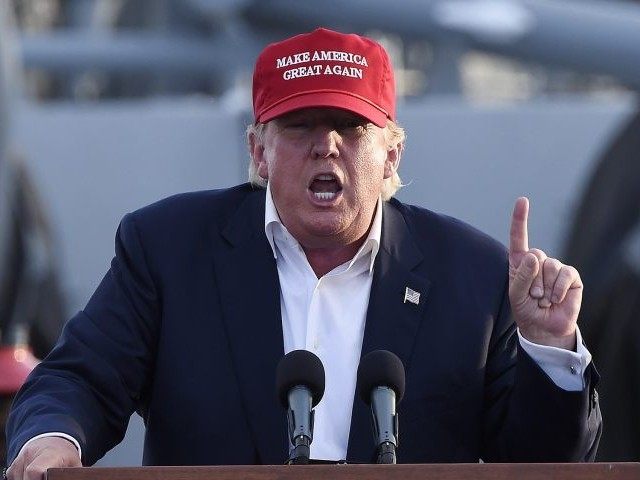On September 18, Donald Trump released a position paper in which he took the strongest stand on Second Amendment policies that any of the Republican primary hopefuls have taken to date.
He wades into policy by reminding Americans that the Constitution does not created a right to keep and bear arms but recognizes and protects a right that has always existed.
Trump put it this way: “The Second Amendment guarantees a fundamental right that belongs to all law-abiding Americans. The Constitution doesn’t create that right — it ensures that the government can’t take it away.”
Notice two things: One, the right to keep and bear arms preceded the Second Amendment. Our Founding Fathers did not create the right, rather, they embraced it then protected it with the Second Amendment. Two, note how Trump describes the right to keep and bear arms as “fundamental.” It is fundamental because it is intrinsic to our humanity. The right to be armed is a testimony to the value of our lives, as humans, and of the dignity befitting humanity.
After laying this foundation Trump wades into specifics and declares that “concealed carry is a right, not a privilege.” He dismisses “assault weapons” bans and “high capacity” magazine bans as undertakings that only result in limiting the choices law-abiding citizens have when arming themselves for self-defense. And he advocates for national reciprocity for concealed carry permit holders so they can carry guns for self-defense, regardless of which of state they are in when they want to carry.
Trump also takes a strong stand against the expansion of background checks. He points out that we have had background checks since 1998 and they do not keep criminals from getting guns. However, background checks do create another burden law-abiding citizens have to undertake in order to get the guns they need in order to defend their own lives and the lives of their families.
Trump’s reaction to the heinous August 26 murder of a WDBJ TV reporter and cameraman served as an indicator of what he believes the better response to gun crime should be. On August 27, Breitbart News reported Trump’s observation that Vester Lee Flanagan’s actions were the result of “a mental problem” not “a gun problem.” He told CNN’s Chris Cuomo that Flanagan was “a very sick man” who should have been “institutionalized.”
Trump added, “In the old days, they had mental institutions for people like [Flanagan] because he was really, definitely borderline and definitely would have been and should have been institutionalized.”
So it makes sense that part of Trump’s plan to protect gun rights is repairing America’s failing mental health system rather than punish law-abiding citizens for the crimes of persons who may or may not be mentally ill. He wants to fix the mental health system so that persons who should be receiving treatment — or should be institutionalized — are in fact getting what they need, making society safer.
Sen. Ted Cruz (R-TX) and Wisconsin Gov. Scott Walker (R) are perhaps the closest to Trump in their policy stances on guns, but neither has issued a succinct statement explaining their positions across a broad spectrum like Trump has done. Presidential hopeful Carly Fiorina talks pro-gun, but she has not released any policy on the subject either.
Republican primary hopeful Mike Huckabee has been vocal in his opposition to expanding background checks since Sen. Joe Manchin (D-WV) began pushing such an expansion in 2013. In fact, on April 4, 2013, the Huffington Post reported that Huckabee was warning that expanded background checks would lead to a gun registry and he was using examples from around the world to show that gun registries historically lead to confiscation. But Huckabee has released no focused gun policy beyond this.
New Jersey Gov. Chris Christie has been weak on gun rights, and he attempts to excuse this by blaming the legislators with whom he has to work. The Wall Street Journal reported that Christie used a March 24 town hall meeting to tell voters, “Send me a Republican legislature. And with a Republican legislature you’ll have a governor who will respect, appropriately, the rights of law-abiding citizens to be able to protect themselves.”
Then there is Jeb Bush. It was Bush who responded to a question during the September 16 GOP debate by voicing support for states confiscating guns when a family member expresses concern about the mental state of a particular gun owner. He made clear that he not only supports it, but that “we need to encourage that kind of involvement.”
Bush’s response is reactionary, whereas Trump’s response is proactive. Bush supports reacting to concerns over mental illness via more state laws on gun control while Trump’s argument is to focus on the mentally ill persons, not guns. In other words, do not legislate for all based on the problems that may arise from a few. Rather, be sure those few are getting the help they need–or that they are removed to an institution–so that law-abiding citizens can continue to enjoy the right to keep and bear arms without infringement.
Follow AWR Hawkins on Twitter: @AWRHawkins. Reach him directly at awrhawkins@breitbart.com.

COMMENTS
Please let us know if you're having issues with commenting.